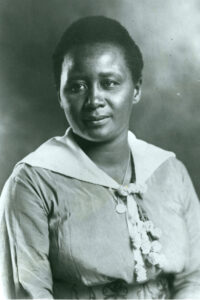
Rosa Jinsey Young is known as the mother of black Lutheranism in central Alabama, as she singlehandedly brought the Lutheran church to rural Alabama from 1916 onward, establishing churches and schools for underserved black children and families. Her ministry led to the founding of what is now known as Concordia College Alabama in Selma, the only historically black Lutheran college in the nation.
Rosa was born in 1890 in Rosebud, Alabama, a small, rural community between Montgomery and Mobile. It remains an unincorporated community to this day. Upon the suggestion of the farm owner whose fields she worked in, and with the approval of her parents, Rosa earned enough money to buy her books, clothes, and train fare and set out to attend Payne University in Selma, Alabama. After graduating, Rosa opened The Rosebud Literary and Industrial School in her hometown in 1912.
By 1914, the school body grew to 215 students, but in 1914 pestilence hit the surrounding farms and her school began to flounder financially. Rosa sought assistance from The Evangelical Lutheran Synodical Conference (then affiliated with the Missouri Synod) who provided support and worked with her to found other schools in the general area. Within a few months, 58 people were baptized and 70 people were confirmed in Wilcox County. Rosa was the first black Lutheran convert in Alabama.
Rosa continued to teach and fundraise through the 1920s and 1930s and travelled to spread the word about the African American mission in Alabama. In 1922, Rosa’s influence helped to found The Alabama Lutheran Academy and College. There she was employed as a faculty member from 1946 through 1961. By that point the school was named Concordia College.
The Synodical Conference churches in Alabama, Mississippi, and Louisiana dissolved and integrated into the formerly all white Southern District of the Synod during the civil rights era of the mid-1960s. Young was honored by the Lutheran Church-Missouri Synod for her dedicated service with an honorary doctorate (LL.D.) from Concordia Theological Seminary in 1961.
She died on June 30, 1971, and was buried near Christ Lutheran Church in Rosebud, in accordance with her final wishes. Concordia College Alabama operated until 2018, when it closed after graduating its final class.